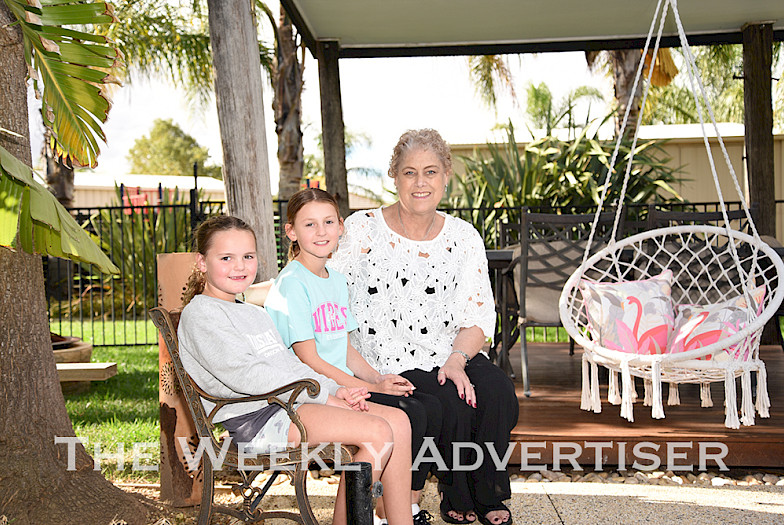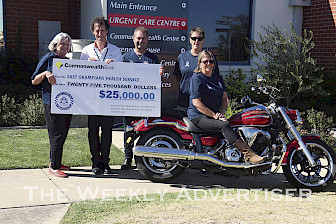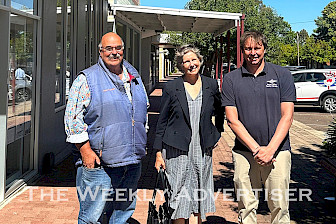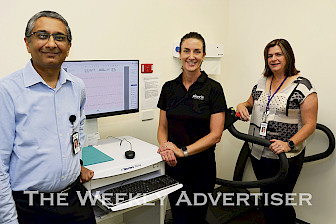On top of the emotional upheaval and time spent travelling to appointments, the financial burden is considerable.
The Leukaemia Foundation’s research has found blood cancers are one of the costliest cancers to treat, with expenses ranging from $5000 to $11,000, compared with other cancer patients who incur about $2500 in out-of-pocket costs.
Leukaemia costs the health system about $46,000 an individual each year, almost triple the average cost incurred by other cancer patients in Australia.
Mrs Bergen has received support from the Leukaemia Foundation’s blood cancer support co-ordinators and has stayed in the foundation’s accommodation in Melbourne.
The foundation aims to provide the accommodation at no cost to patients and their families, achieved through community donations and a government subsidy scheme.
“We have stayed overnight at times, used the supported accommodation or stayed with family, but we also do day trips. It’s just nice to be at home,” Mrs Bergen said.
“We are lucky, too, that we can claim fuel using the patient transport assistance scheme, otherwise we’d be out of pocket another $100 a week.”
Mrs Bergen said she and her husband Jason, a Horsham-based police member, travelled to appointments together.
“His work has been very supportive. He has been able to take the time to travel and be there with me,” she said.
Mrs Bergen has just started the process of re-vaccination, with the bone marrow transplant process wiping her immunity of every vaccine she’s ever received from birth – and giving her a new blood type.
“I used to be A negative, now I’m B positive,” she said.
Extra hurdles
Mrs Bergen said she was quite sick throughout her treatment, with the extra hurdles of contracting a virus that became lymphoma and required further treatment, then covid that developed into pneumonia.
“I feel like I am coming out of the other end now,” she said.
“It’s so good, so good to feel well again.”
In Mrs Bergen’s words, she has been ‘a bit unlucky’, having undergone treatment for breast cancer 10 years ago.
At the time she was a Horsham-based police sergeant and persevered with treatment and working, but with night shifts and the demands of the job, she found it too hard and retired.
“I did a few other things for a while, but then retired fully,” she said.
One of those other things was joining the consultative committee to get the ball rolling on a new cancer centre for Horsham.
“I used the old centre while I had breast cancer treatment,” Mrs Bergen said.
“So when it came to discussing what features we’d like in the new build, we decided to incorporate a wellness centre, where patients could relax or fill in time with television or reading somewhere other than a waiting room.”
Wimmera Cancer Centre has provided some treatment options in Mrs Bergen’s hometown.
“The cancer centre staff have been really wonderful, They just talk to the Austin Hospital and can do what they can here,” she said.
“It saves us a trip to Melbourne.”
Mrs Bergen will travel to Melbourne again next week to see her specialist for a positron emission tomography, PET, scan and a bone marrow biopsy.
“While it has been hard being away so long, sometimes for months at a time, I would like to thank my friends and family who have helped, cooked food, and kept the house standing while we were gone,” she said.
Coincidentally, it was a Horsham-based Victoria Police member who started a head-shaving fundraising campaign in Horsham in the 1990s.
It was known as ‘Crop a Cop’ and raised money for children with cancer, before the campaign became Bluey Day in 1998. The Bluey Day Foundation ceased operation in 2010 after raising more than $20 million.
Today, the Leukaemia Foundation’s World’s Greatest Shave raises money for blood cancer research and support. Hair-shaving and colouring events are typically scheduled in March, but can happen at any time during the year at the organiser’s discretion.
The foundation has also launched its new fundraising program, The Giving Cell, to enable the continuation of services including emotional support, information on treatment, assistance with transport, accommodation and financial assistance.
People wanting more information or to donate to The Giving Cell, can visit www.leukaemia.org.au.
The entire April 17, 2024 edition of The Weekly Advertiser is available online. READ IT HERE!






